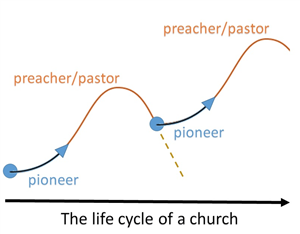Where have all the APEs gone?
This might seem like a strange question, but it's one that explains why the Pioneer Collective has a vision to identify and release 400 new Baptist pioneers, explains Simon Goddard
 We need to start by taking a look at Ephesians 4:11-12 (ESV)...
We need to start by taking a look at Ephesians 4:11-12 (ESV)...
"And he gave the apostles, the prophets, the evangelists, the shepherds and teachers, to equip the saints for the work of ministry, for building up the body of Christ."
Here we see the various shapes of ministry given by Jesus as a means of bringing life and growth to the church. It is sometimes described as the 'fivefold' ministry, and the different roles of Apostles, Prophets, Evangelists, Shepherds and Teachers can be remembered using the acronym APEST.
Whilst in Jesus we may well have seen all five of these roles encompassed in one person, those who minister generally demonstrate a gifting and calling in one or possibly two of them. If we did a survey of the ordained ministers in our churches, however, I am sure we would find a predominance of shepherds and teachers, and thus the question "where have all the APEs gone?" arises.
Why are the apostles, prophets and evangelists missing from our churches, and what can we do to bring them back?
If all five 'pillars' of ministry are required for "building up" the church, then it surely can't be healthy for our churches when three of them are missing.
Clearly when we talk about leadership in our churches we aren't only referring to the ordained minister - although I think if we looked in our diaconates and ministry teams, we would still find a lack of APEs.
But how would you recognise what an APE is anyway? Let's take them in reverse order:
Evangelist
This is probably the most easily identifiable of the three - an evangelist is someone (like Chris Duffett) who seems effortlessly to be able to share the gospel with others.
As a Union we already recognise and nurture this gift and there are a small number of accredited evangelists within the Baptist family.
The reality, however, is that very few of our churches will call a stipended evangelist as part of their ministry team, and those few evangelists who do manage to make ends meet either end up having to set up their own charity (which can easily disconnect them from the local church) or being squeezed into a more traditional shape of church leadership.
Prophet
These people are perhaps more difficult to categorise, and any definition is going to be an oversimplification of this spiritual gift.
Here, however, I would describe a prophet as the person who is able to read the culture and whose heart is to bring transformation and renewal to the church.
They can see what God is calling the church to be in each particular generation, and they desire to bring about the change that is necessary for the church to effectively engage in the mission of God.
Apostle
This label is perhaps the most controversial - but at its simplest this is a person who is 'sent' on behalf of the church to begin something new.
Whatever the history of your church it was probably planted by someone with an apostolic gift, even if this wasn't the language used to describe them at the time. In this generation these include the individuals who are starting fresh expressions of church, and are passionate about making the church relevant to the 94% of people who aren't yet engaging with it.
The language is imperfect, but in different ways all APEs probably fall within the category of 'pioneer', and we can find examples of them in the New Testament:
-
Like Paul, apostles pioneer by sowing the seeds of the gospel in new places, and seeing churches grow;
-
Like Peter, prophets pioneer by bringing a fuller understanding of the gospel and its implications to an existing community of God's people;
-
And like Luke or John, evangelists pioneer by taking the good news to people who have yet to hear it.
Why are the apostles, prophets and evangelists missing from our churches, and what can we do to bring them back?
At any one time a church would benefit from having a balance of these gifts and callings amongst their leaders and congregation. For different chapters in a church's story, however, some characters have a more prominent role than others.
 At the very beginning, as has already been noted, it is likely to be an APE, a pioneer, who helps to plant the church and oversee its early growth.
At the very beginning, as has already been noted, it is likely to be an APE, a pioneer, who helps to plant the church and oversee its early growth.
Those with ST gifts then need to take over, with the shepherd-teacher taking on a 'settler' role by nurturing the community, discipling it and putting its roots deeper into the Word.
There usually comes a time, however, in a church's life cycle, when its growth has plateaued or started to decline, and this is the time when the congregation can benefit from calling a pioneer into its midst.
The gifts of the pioneer will help the church to make the changes necessary to experience further growth and renewal. Then, after a while, it's time for the preacher-pastor again, and so the cycle continues - or at least it should!
With a lack of APEs, however, the cycle is broken: churches aren't planted and decline sets in to existing congregations. And that is why the Pioneer Collective has a vision to enable us, as Baptists Together, to identify, release and resource 400 new pioneers.
This means finding individuals within the membership of our churches who can be released and commissioned by their congregations to do new things.
It also has implications for the processes of recognising and training ordained ministers, as well as the challenge for churches to identify where they are in the life cycle, and call the right type of minister to help them move forward.
Please do contact the Pioneer Collective for more information about the vision, or if you want to explore some of the thoughts in this article further I would recommend reading the book The Permanent Revolution by Alan Hirsch and Tim Catchim. As we rediscover and apply the teaching of Ephesians 4 I am excited about how God can use it to bring renewal and growth to His church.
The Revd Simon Goddard is the Co-ordinator of the Pioneer Collective, and a Regional Minister in the Eastern Baptist Association
Contact him on: simon@pioneercollective.org.uk or 0845 475 4003
This article first appeared in the Autumn 2015 edition of Baptists Together magazine
Baptists Together, 05/09/2015